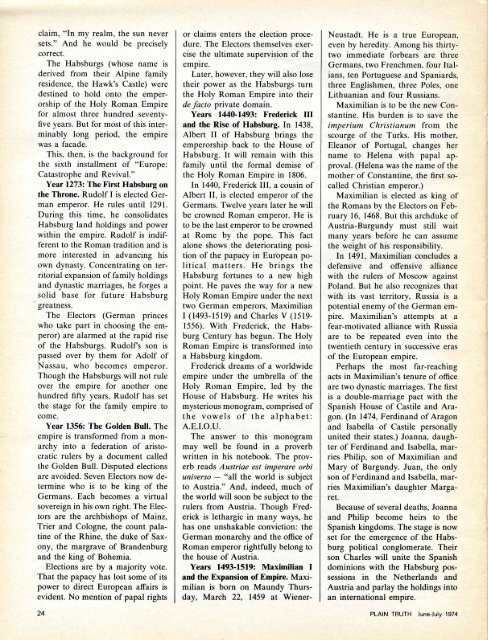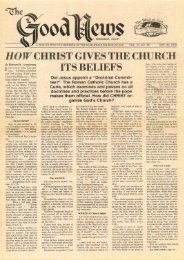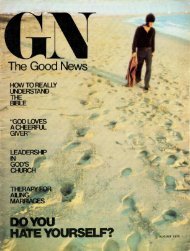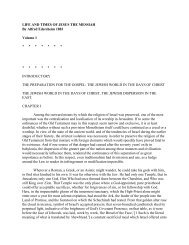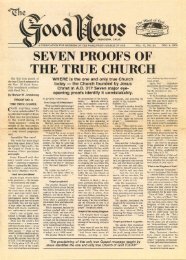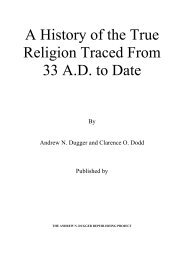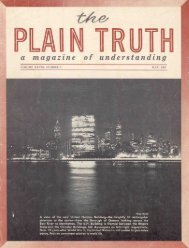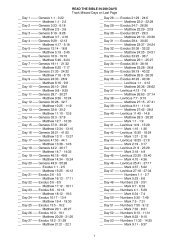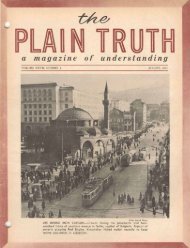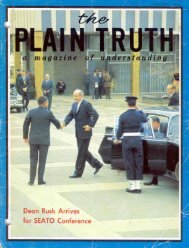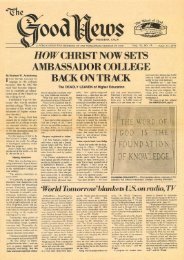Create successful ePaper yourself
Turn your PDF publications into a flip-book with our unique Google optimized e-Paper software.
claim, "In my realm, the sun never<br />
sets." And he would be precisely<br />
correct.<br />
The Habsburgs (whose name is<br />
derived from their Alpine family<br />
residence, the Hawk's Castle) were<br />
destined to hold onto the emperorship<br />
of the Holy Roman Empire<br />
for almost three hundred seventyfive<br />
years. But for most of this interminably<br />
long period, the empire<br />
was a facade.<br />
This, then, is the background for<br />
the sixth installment of "Europe:<br />
Catastrophe and Revival."<br />
Year 1273: The First Habsburg on<br />
the Throne. Rudolf I is elected German<br />
emperor. He rules until 1291.<br />
During this . time, he consolidates<br />
Habsburg land holdings and power<br />
within the empire. Rudolf is indifferent<br />
to the Roman tradition and is<br />
more interested in advancing his<br />
own dynasty. Concentrating on territorial<br />
expansion of family holdings<br />
and dynastic marriages, he forges a<br />
solid base for future Habsburg<br />
greatness.<br />
The Electors (German princes<br />
who take part in choosing the emperor)<br />
are alarmed at the rapid rise<br />
of the Habsburgs. Rudolfs son is<br />
passed over by them for Adolf of<br />
Nassau, who be<strong>com</strong>es emperor.<br />
Though the Habsburgs will not rule<br />
over the empire for another one<br />
hundred fifty years, Rudolf has set<br />
the stage for the family empire to<br />
<strong>com</strong>e.<br />
Year 1356: The Golden Bull. The<br />
empire is transformed from a monarchy<br />
into a federation of aristocratic<br />
rulers by a document called<br />
the Golden Bull. Disputed elections<br />
are avoided. Seven Electors now determine<br />
who is to be king o( the<br />
Germans. Each be<strong>com</strong>es a virtual<br />
sovereign in his own right. The Electors<br />
are the archbishops of Mainz,<br />
Trier and Cologne, the count palatine<br />
of the Rhine, the duke of Saxony,<br />
the margrave of Brandenburg<br />
and the king of Bohemia.<br />
Elections are by a majority vote.<br />
That the papacy has lost some of its<br />
power to direct European affairs is<br />
evident. No mention of papal rights<br />
24<br />
or claims enters the election procedure.<br />
The Electors themselves exercise<br />
the ultimate supervision of the<br />
empire.<br />
Later, however, they will also lose<br />
their power as the Habsburgs turn<br />
the Holy Roman Empire into their<br />
de facto private domain.<br />
Years 1440-1493: Frederick III<br />
and the Rise of Habsburg. In 1438,<br />
Albert II of Habsburg brings the<br />
emperorship back to the House of<br />
Habsburg. It will remain with this<br />
family until the formal demise of<br />
the Holy Roman Empire in 1806.<br />
In 1440, Frederick III, a cousin of<br />
Albert II, is elected emperor of the<br />
Germans. Twelve years later he will<br />
be crowned Roman emperor. He is<br />
to be the last emperor to be crowned<br />
at Rome by the pope. This fact<br />
alone shows the deteriorating position<br />
of the papacy in European political<br />
matters. He brings the<br />
Habsburg fortunes to a new high<br />
point. He paves the way for a new<br />
Holy Roman Empire under the next<br />
two German emperors, Maximilian<br />
I (1493-1519) and Charles V (1519-<br />
1556). With Frederick, the Habsburg<br />
Century has begun. The Holy<br />
Roman- Empire is transformed into<br />
a Habsburg kingdom.<br />
Frederick dreams of a worldwide<br />
empire under the umbrella of the<br />
Holy Roman Empire, led by the<br />
House of Habsburg. He writes his<br />
mysterious monogram, <strong>com</strong>prised of<br />
the vowels of the alphabet:<br />
A.E.I.O.U.<br />
The answer to this monogram<br />
may well be found in a proverb<br />
written in his notebook. The proverb<br />
reads Austriae est imperare orbi<br />
universo - "all the world is subject<br />
to Austria." And, indeed, much of<br />
the world will soon be subject to the<br />
rulers from Austria. Though Frederick<br />
is lethargic in many ways, he<br />
has one unshakable conviction: the<br />
German monarchy and the office of<br />
Roman emperor rightfully belong to<br />
the house of Austria.<br />
Years 1493-1519: Maximilian I<br />
and the Expansion of Empire. Maximilian<br />
is born on Maundy Thursday,<br />
March 22, 1459 at Wiener-<br />
Neustadt. He is a true European,<br />
even by heredity. Among his thirtytwo<br />
immediate forbears are three<br />
Germans, two Frenchmen, four Italians,<br />
ten Portuguese and Spaniards,<br />
three Englishmen, three Poles, one<br />
Lithuanian and four Russians.<br />
Maximilian is to be the new Constantine.<br />
His burden is to save the<br />
imperium Christianum from the<br />
scourge of the Turks. His mother,<br />
Eleanor of Portugal, changes her<br />
name to Helena with papal approval.<br />
(Helena was the name of the<br />
mother of Constantine, the first socalled<br />
Christian emperor.)<br />
Maximilian is elected as king of<br />
the Romans by the Electors on February<br />
16, 1468. But this archduke of<br />
Austria-Burgundy must still wait<br />
many years before he can assume<br />
the weight of his responsibility.<br />
. In 1491 , Maximilian concludes a<br />
defensive and offensive alliance<br />
with the rulers of Moscow against<br />
Poland. But he also recognizes that<br />
with its vast territory, Russia is a<br />
potential enemy of the German empire.<br />
Maximilian's attempts at a<br />
fear-motivated alliance with Russia<br />
are to be repeated even into the<br />
twentieth century in successive eras<br />
of the European empire.<br />
Perhaps the most far-reaching<br />
acts in Maximilian's tenure of office<br />
are two dynastic marriages. The first<br />
is a double-marriage pact with the<br />
Spanish House of Castile and Aragon.<br />
(In 1474, Ferdinand of Aragon<br />
and Isabella of Castile personally<br />
united their states.) Joanna, daughter<br />
of Ferdinand and Isabella, marries<br />
Philip, son of Maximilian and<br />
Mary of Burgundy. Juan, the only<br />
son of Ferdinand and Isabella, marries<br />
Maximilian's daughter Margaret.<br />
Because of several deaths, Joanna<br />
and Philip be<strong>com</strong>e heirs to the<br />
Spanish kingdoms. The stage is now<br />
set for the emergence of the Habsburg<br />
political conglomerate. Their<br />
son Charles will unite the Spanish<br />
dominions with the Habsburg possessions<br />
in the Netherlands and<br />
Austria and parlay the holdings into<br />
an international empire.<br />
PLAIN TRUTH June·July 1974


